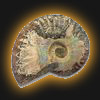
Ammonites were cephalopods (predatory marine mollusks) similar to the modern Squid, Octopus and chambered Nautilus. Ammonite plays a key role in the traditional culture and magicof many tribals. Ammonites displaying one or more distinct colors or play of colors are graded A, while in B grades, colors are less distinct or they may show directional color.
A selection of fossil and ammonite cabs available for custom designed jewelry. It is a protective stone giving stability and structure to one's life. Aids in the birth process.
The ammonite shell containes a series of progressively larger chambers divided by thin walls called septa, with only the last and largest chamber occupied by the living animal. Ammonites vary greatly in the ornamentation of their shells.
Some may be smooth and relatively featureless, except for growth lines, and resemble that of the modern nautilus.

The Navajo people carried Ammonites in their medicine bags for health and good hunting. During the middle ages Ammonites were called Draconites due to the belief that they came from the heads of dragons. Another name is "snakestone", which was popular among occult circles. In England today, as in ancient history, the Ammonite is considered to be a stone that grants miracles.For nearly 330 million years, they were abundant in all of the oceans until they suddenly became extinct, around the same time as the demise of the Dinosaurs.
Ammonites occur inAlberta, Canada
